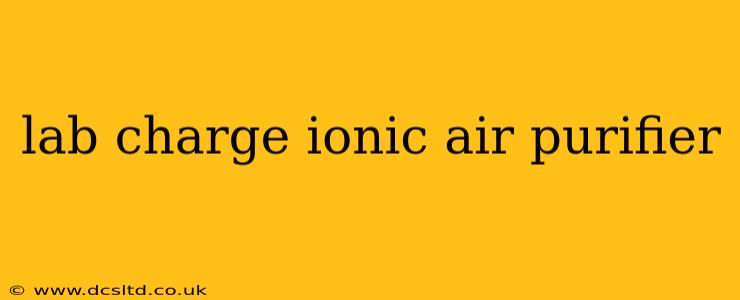Ionic air purifiers are becoming increasingly popular for their ability to clean the air in various settings, from homes to laboratories. This guide focuses specifically on the use of ionic air purifiers in laboratory environments, addressing common concerns and providing helpful information to determine if this technology is right for your needs. We'll delve into the specific benefits, limitations, and factors to consider when choosing an ionic air purifier for a lab setting.
What is an Ionic Air Purifier?
Ionic air purifiers work by emitting negatively charged ions into the air. These ions attach to airborne particles like dust, pollen, mold spores, and even some bacteria and viruses, making them heavier. This increased weight causes the particles to fall to the ground or be more easily captured by filters, ultimately removing them from the air you breathe. Unlike HEPA filters, which physically trap particles, ionic purifiers neutralize and remove them through electrostatic attraction.
How Effective are Ionic Air Purifiers in a Lab Setting?
The effectiveness of an ionic air purifier in a laboratory depends on several factors, including the size of the room, the concentration of airborne contaminants, and the specific type of purifier used. While ionic purifiers can be effective at removing certain types of particles, they may not be suitable for all laboratory applications. For instance, they are generally less effective at removing very small particles (like certain gases or volatile organic compounds often found in labs), compared to HEPA filtration systems. Additionally, the effectiveness can be reduced in environments with high humidity.
What are the benefits of using an ionic air purifier in a lab?
- Reduced airborne particulate matter: Ionic air purifiers can help reduce levels of dust, pollen, and other larger particles, improving air quality and potentially reducing allergic reactions for lab personnel.
- Cost-effective solution: Compared to other air purification technologies, ionic air purifiers are often relatively inexpensive to purchase and operate.
- Quiet operation: Many ionic air purifiers operate quietly, making them suitable for use in sensitive laboratory environments.
- Low maintenance: Generally, ionic air purifiers require minimal maintenance, primarily involving occasional cleaning of the unit's surfaces.
What are the limitations of using an ionic air purifier in a lab?
- Ineffective against certain contaminants: As mentioned, ionic purifiers are less effective at removing gases, volatile organic compounds, and very small particles frequently present in lab environments. These require specialized filtration methods.
- Ozone production: Some ionic air purifiers produce ozone as a byproduct, which can be harmful to human health at high concentrations. It's crucial to choose a model that minimizes ozone generation.
- Not a complete solution: For many labs, ionic air purifiers should be considered a supplementary technology, not a replacement for other safety and air purification measures. A comprehensive safety plan is always necessary.
- Effectiveness dependent on environmental factors: High humidity and air currents can significantly reduce the effectiveness of ionic air purification.
What types of particles do ionic air purifiers remove?
Ionic air purifiers are primarily effective at removing larger airborne particles such as dust, pollen, pet dander, and mold spores. Their effectiveness against smaller particles, including viruses and bacteria, is debated and often less effective than HEPA filtration.
Do ionic air purifiers remove odors?
Ionic air purifiers can help to reduce some odors, but their effectiveness varies depending on the type and source of the odor. They may be more successful with odors associated with larger airborne particles carrying the scent, rather than pervasive gaseous odors.
How do I choose the right ionic air purifier for my lab?
Choosing the right ionic air purifier for your lab requires careful consideration of factors such as the size of the room, the type and concentration of airborne contaminants, and budget. Look for models with features like ozone-reduction technologies and certifications from reputable testing organizations to ensure safety and performance. Always consult with a laboratory safety professional to determine the best air purification solution for your specific needs.
Are ionic air purifiers safe for use in a lab?
Ionic air purifiers are generally considered safe for use in a laboratory when used properly and when selecting models that minimize ozone production. However, it's important to follow the manufacturer's instructions carefully and to ensure adequate ventilation to prevent ozone buildup. They should never replace other critical safety measures and protocols.
This guide provides a foundation for understanding the role of ionic air purifiers in laboratory settings. Remember that a comprehensive air quality management strategy is essential for maintaining a safe and productive laboratory environment. Always prioritize safety and consult with professionals to determine the optimal air purification system for your specific lab requirements.
